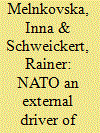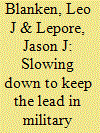| Srl | Item |
| 1 |
ID:
105046


|
|
|
|
|
| Publication |
2011.
|
| Summary/Abstract |
This paper is the first to demonstrate a viable prediction market that successfully forecasts defense acquisition cost and schedule outcomes, and to provide insights for defense executive decision-making. Already used in private industry, prediction markets can also accurately forecast outcomes and their associated risks for government programs. Using virtual money, prediction markets allow traders to 'bet' on some future outcome. This market mechanism turns out to be a relatively simple and accurate way to discover, aggregate, and communicate to a defense executive the collective market's beliefs about the likelihood of an eventual outcome of an acquisition program of interest.
|
|
|
|
|
|
|
|
|
|
|
|
|
|
|
|
| 2 |
ID:
105043


|
|
|
|
|
| Publication |
2011.
|
| Summary/Abstract |
I survey much evidence on mortality in Iraq, including data from the first and second Lancet surveys. The second Lancet survey is inconsistent with all credible and relevant information on levels and trends in violent deaths and on the geographical distribution of violence. I discuss weaknesses in attempts made by The Bloomberg School of Public Health and authors of the second Lancet survey to claim corroboration for the second Lancet survey from other sources. These attempts notwithstanding, the second Lancet survey is a clear outlier within a wide body of evidence on mortality in Iraq.
|
|
|
|
|
|
|
|
|
|
|
|
|
|
|
|
| 3 |
ID:
105042


|
|
|
|
|
| Publication |
2011.
|
| Summary/Abstract |
So far, economic analyses of NATO enlargement have been restricted to aspects of regional security while political analyses focused on indirect peace-building effects on democracy in the first place. Our panel regressions for 25 post-communist countries for the period from 1996 to 2008 reveal that direct incentives provided by NATO pre-accession are important for broad-based institutional development. Results are even more robust than for variables measuring EU pre-accession or NATO membership effects. This supports the argument that NATO can act as a transformative power and should strengthen its political agenda.
|
|
|
|
|
|
|
|
|
|
|
|
|
|
|
|
| 4 |
ID:
105045


|
|
|
|
|
| Publication |
2011.
|
| Summary/Abstract |
This paper explores the potential civil use from the knowledge embedded in military technology. Using forward patent citation as indicator and from a comprehensive sample of 582 military patents with both US and European protection, we analysed the citations received for a military patents in subsequent patents. The technological origin of the citing patents will determine the use of a military technology. The methodology involves a descriptive analysis and the estimation of a multilevel logit model to determine the factors explaining the civilian use of military technology. The results show a differential behaviour among countries and types of military technology. Characteristics of firms, such as the technological experience of the company or institution in using military technology, are critical for a civilian use of the military knowledge.
|
|
|
|
|
|
|
|
|
|
|
|
|
|
|
|
| 5 |
ID:
105041


|
|
|
|
|
| Publication |
2011.
|
| Summary/Abstract |
Lotteries can be used to meet shortages in military-manpower-demanding situations before and during a large-scale war. By developing a new lottery mechanism that is fair in that everyone has the same success rate, the approach adopted in this paper is able to outperform the traditional lottery by generating extra rents in such a way that brothers or similar close family members can choose to maximize the chance that at least one person stays home, thereby reducing social cost. We use 2010 data for three war hot zones - namely, South Korea, Colombia and Taiwan - as examples.
|
|
|
|
|
|
|
|
|
|
|
|
|
|
|
|
| 6 |
ID:
105044


|
|
|
|
|
| Publication |
2011.
|
| Summary/Abstract |
We develop a model of military technology competition among states. States can choose to introduce new military technology, mimic rivals' level of technology, or withdraw from the contest. States can choose to implement any level of technology within their current feasible technologies. We find that states with significant technological leads should sometimes withhold new technologies, only strategically releasing them to trump rivals' efforts. We develop the model by refining Admiral Jackie Fisher's roughly articulated concept of 'plunging'. We then use this refined argument to reanalyze the case of naval rivalries among European powers between the Crimean War and the First World War. Finally, we conclude by discussing the model's implications for current US military force structure planning.
|
|
|
|
|
|
|
|
|
|
|
|
|
|
|
|